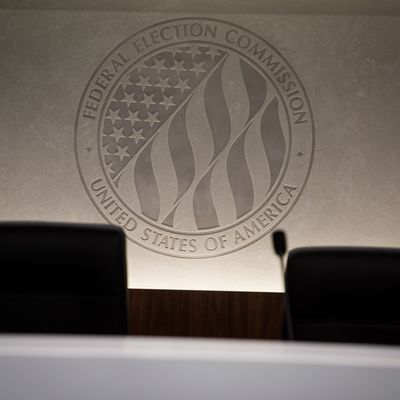
Many problems hang over the 2020 election — the developing climate-debate tiff, the possibility that Trump won’t accept an electoral college loss, a Russian interference sequel — but an unflashy concern was raised Monday with the resignation of Federal Election Commission vice-chair Matt Petersen. With only three remaining vice-chairs, the FEC no longer has its four-commissioner quorum, and will not be able to conduct meetings or properly enforce election laws in 2020, or punish campaigns for any violations.
When operating as intended, there are six FEC commissioners, who determine the ins and outs of campaign-finance regulation. But because the president has left at least one commissioner’s seat empty for over two years, the agency is running on fumes, like so many other limbs of government: As of March, Trump had yet to fill 140 top positions in his administration. (However, it is still possible for the FEC to fill the necessary seats before the general election: According to a senior GOP aide who spoke with Washington Post editor Matea Gold, the administration is discussing a whole new batch of six appointees to replace the panel.)
In a statement to Bloomberg, the FEC’s remaining Republican commissioner Caroline Hunter said that it would be “business as usual” at the regulatory agency in some respects, mentioning that audits and litigation already in process will continue, and that they will still publish campaign-finance reports. But without the four-person quorum, she noted that the “Commission will not be able to hold meetings, initiate audits, vote on enforcement matters, issue advisory opinions, or engage in rulemakings.” As Politico notes, all wasn’t necessarily well with a full board either:
Even prior to Petersen’s departure, the commission struggled agree on key issues, including how to handle cybersecurity and foreign election interference. The committee has also deadlocked on many questions regarding donor disclosure, coordination between candidates and outside groups, and other issues in recent years, with three Democratic-aligned commissioners often voting on one side and three GOP-aligned commissioners on the other side.
Though the FEC faced a no-quorum dilemma in 2008, it isn’t great timing for the agency governing campaign finance to be stripped of its regulatory muscle entering what is anticipated to be the most expensive race in history. The lack of regulatory power is even more concerning, considering the president’s claim in June that he’d accept foreign dirt on political opponents, his relationship with the ethics of financial disclosure at large, and his past run-ins with the FEC. Shortly after the 2016 election results came in, the agency called out Trump for over 1,000 errors in his campaign’s filings.






























